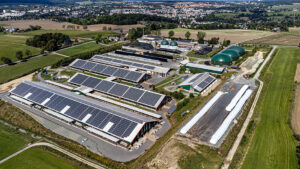First WELTEC BIOPOWER Kumac plant goes live in Germany

This is the first Kumac plant to go live in Germany, in addition to the 16 that have been built worldwide to date.
The agricultural company, which is based in the Vogtland region of Saxony, Germany, specialises in dairy farming and the cultivation of feed crops.
In addition to the dairy farm with 1,400 cows and breeding cattle, the farmers have been operating a biogas plant with an electrical output of 845 kW since 2006. The facilities generate up to 72,000 t of liquid manure and digestate a year.
Every day, the biogas plant feeds 12,000 kWh of electricity into the public grid.
In addition, the plant supplies up to 500 kW of heat to small consumers and to the site of the former Paracelsus Clinic in Reichenbach via a heating network.
The plant's main business consists of the delivery of biogas via a 3.2-km raw biogas pipeline to the heating plant of Stadtwerke Reichenbach for the base load supply of flats and social facilities.
The amount of electricity generated each year corresponds to the annual consumption of around 6,000 private households.
Within the scope of the Leipzig Biogas Expert Talks, Deutsche Biomasseforschungszentrum gemeinnützige GmbH (DBFZ) had already invited visitors to the Application Day in Reichenbach in December 2023.
The numerous professional visitors made use of the opportunity to visit the biogas plant as well as the digestate processing plant of WELTEC BIOPOWER.
The introduction of modern technologies and systems such as the Kumac system greatly contributes to the recycling of nutrients and the conversion of liquid manure into compost, fertiliser, animal bedding or biogas substrate.
For the conversion, Kumac makes use of tried-and-tested processes that are fine-tuned to each other.
"In Reichenbach, the output of the Kumac process consists of around 25% solid and 20% liquid farm manure and 55% dischargeable water. The resulting solid matter and the nutrient concentrate are applied as organic, high-quality fertiliser to our own crops. In this way, long transport routes are avoided," explained Lars Bittermann, managing director of Agrar Reichenbach GmbH.
"This closes an efficient material flow cycle, and the individual areas of our portfolio interlock perfectly. From the cultivation of feed crops to dairy farming to the utilisation of the liquid manure in the biogas plant and the processing of digestate into fertiliser and water, all components have their place."


























